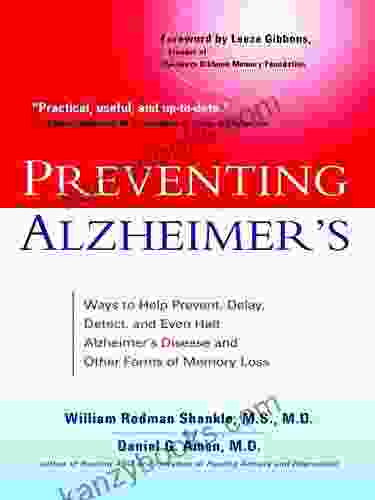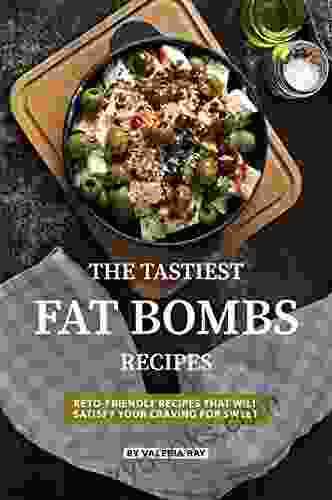Unlocking Secrets to Alzheimer's Prevention: A Comprehensive Guide

The relentless march of Alzheimer's disease and other forms of dementia can cast a shadow over our golden years. However, groundbreaking research is shedding light on the potential to prevent, detect, and even halt the progression of these debilitating conditions.
4.6 out of 5
| Language | : | English |
| File size | : | 4225 KB |
| Text-to-Speech | : | Enabled |
| Screen Reader | : | Supported |
| Enhanced typesetting | : | Enabled |
| Word Wise | : | Enabled |
| Print length | : | 308 pages |
In this comprehensive guide, we delve into the latest scientific findings and provide you with actionable strategies to safeguard your brain health and enhance your cognitive well-being.
Understanding Alzheimer's Disease and Dementia
Alzheimer's disease is the most prevalent form of dementia, accounting for 60-80% of cases. It is characterized by the progressive loss of neurons (nerve cells) in the brain, particularly in areas responsible for memory and cognitive function.
Other types of dementia include:
- Vascular dementia, caused by insufficient blood flow to the brain
- Lewy body dementia, caused by abnormal deposits of protein in the brain
- Frontotemporal dementia, characterized by changes in personality and behavior
Early Detection: The Key to Intervention
The early detection of Alzheimer's disease and related conditions is crucial for timely intervention and improved outcomes. The following signs and symptoms may indicate a need for medical evaluation:
- Memory loss that affects daily activities
- Difficulty with problem-solving and decision-making
- Changes in speech and writing
- Disorientation in time and place
- Poor judgment and impaired social skills
Lifestyle Changes for Brain Health
Research has demonstrated that certain lifestyle changes can significantly reduce the risk of Alzheimer's disease and cognitive decline.
1. Nutrition: Feed Your Brain
A balanced diet rich in fruits, vegetables, whole grains, and lean protein supports optimal brain function. Consider the following dietary recommendations:
- Mediterranean Diet: Emphasizes olive oil, fruits, vegetables, fish, and whole grains.
- MIND Diet: Combines elements of the Mediterranean and DASH (dietary approaches to stop hypertension) diets, with a focus on leafy greens, berries, nuts, beans, and whole grains.
- Omega-3 Fatty Acids: Found in fatty fish (e.g., salmon, tuna),these essential fatty acids play a vital role in brain health.
2. Exercise: The Brain's Workout
Regular physical activity enhances blood flow to the brain and promotes the release of neurotrophic factors, which support neuron growth and survival.
- Aerobic Exercise: Aim for at least 150 minutes of moderate-intensity or 75 minutes of vigorous-intensity aerobic activity per week.
- Strength Training: Incorporate strength-training exercises into your routine 2-3 times per week.
3. Sleep: The Brain's Sanctuary
Adequate and restful sleep is essential for brain health. Aim for 7-9 hours of quality sleep each night. Establish regular sleep-wake cycles, even on weekends.
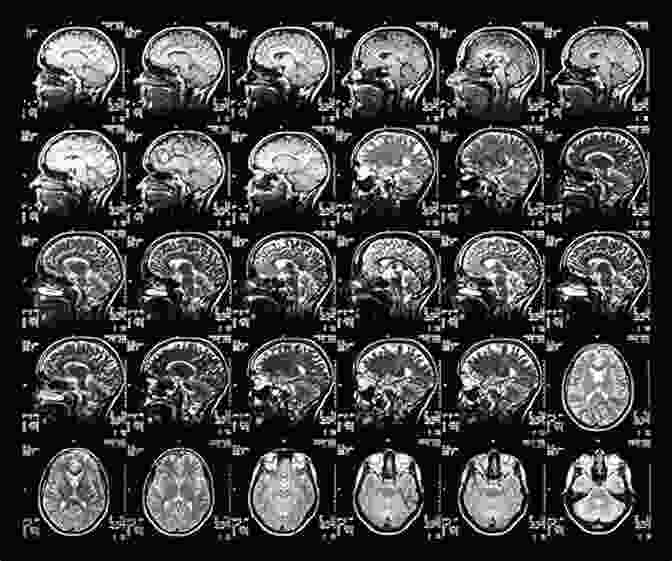
4. Stress Management: Protecting Your Brain from Damage
Chronic stress can have detrimental effects on brain health. Engage in stress-reducing activities such as yoga, meditation, or deep breathing exercises.
5. Social Engagement: Connecting for Your Brain
Social interaction and meaningful connections stimulate your brain and enhance cognitive function. Make efforts to connect with friends, family, and community members regularly.
Cognitive Training: Sharpening Your Mind
In addition to lifestyle changes, cognitive training can help improve brain function and reduce the risk of cognitive decline.
- Memory Training: Engage in activities that challenge your memory, such as learning a new language, memorizing poems, or solving puzzles.
- Problem-Solving: Practice solving complex problems, puzzles, or brain teasers.
- Executive Function Training: Improve skills such as planning, organizing, and decision-making through activities like playing strategy games or managing complex projects.
Supplements and Medications
Certain supplements and medications have shown promise in supporting brain health and potentially slowing the progression of Alzheimer's disease.
Supplements
- Curcumin: A compound found in turmeric, curcumin has antioxidant and anti-inflammatory properties.
- Omega-3 Fatty Acids: As mentioned earlier, omega-3 fatty acids are essential for brain function. Consider supplementing with fish oil capsules.
- Ginkgo Biloba: This herbal extract has been used traditionally to improve memory and cognitive function.
Medications
For individuals with a diagnosis of Alzheimer's disease or other forms of dementia, medications may be prescribed to manage symptoms and slow the progression of cognitive decline.
It is crucial to consult with your healthcare provider before taking any supplements or medications to ensure safety and avoid potential interactions.
A Call to Action: Empowering Yourself
Remember, the steps you take to safeguard your brain health can have a profound impact on your cognitive well-being for years to come. Embrace these strategies, stay informed about the latest research, and spread the word to empower others in the fight against Alzheimer's disease and related conditions.

By implementing these evidence-based strategies, we can collectively reduce the burden of Alzheimer's disease and other forms of dementia, while enhancing our overall cognitive well-being.
Unlock the secrets to Alzheimer's prevention, discover the power of your brain, and embark on a journey towards a brighter and more fulfilling future.
4.6 out of 5
| Language | : | English |
| File size | : | 4225 KB |
| Text-to-Speech | : | Enabled |
| Screen Reader | : | Supported |
| Enhanced typesetting | : | Enabled |
| Word Wise | : | Enabled |
| Print length | : | 308 pages |
Do you want to contribute by writing guest posts on this blog?
Please contact us and send us a resume of previous articles that you have written.
 Book
Book Novel
Novel Page
Page Chapter
Chapter Text
Text Story
Story Genre
Genre Reader
Reader Library
Library Paperback
Paperback E-book
E-book Magazine
Magazine Newspaper
Newspaper Paragraph
Paragraph Sentence
Sentence Bookmark
Bookmark Shelf
Shelf Glossary
Glossary Bibliography
Bibliography Foreword
Foreword Preface
Preface Synopsis
Synopsis Annotation
Annotation Footnote
Footnote Manuscript
Manuscript Scroll
Scroll Codex
Codex Tome
Tome Bestseller
Bestseller Classics
Classics Library card
Library card Narrative
Narrative Biography
Biography Autobiography
Autobiography Memoir
Memoir Reference
Reference Encyclopedia
Encyclopedia Tom Mccoy
Tom Mccoy Shawn Chhabra
Shawn Chhabra Solala Towler
Solala Towler Thomas Richardson
Thomas Richardson Zara Elby
Zara Elby Varda Hasselmann
Varda Hasselmann Scott Jay Marshall Ii
Scott Jay Marshall Ii Sarah Meyers
Sarah Meyers Sonja Schoch
Sonja Schoch Theresa Bane
Theresa Bane Stendhal
Stendhal Steve Behling
Steve Behling Tina Gong
Tina Gong Stepfanie Romine
Stepfanie Romine Jean Stokes
Jean Stokes Shelly Null
Shelly Null Timothy Barrington
Timothy Barrington Tim Dahlberg
Tim Dahlberg Vicki Lesage
Vicki Lesage Stephanie Bennett
Stephanie Bennett
Light bulbAdvertise smarter! Our strategic ad space ensures maximum exposure. Reserve your spot today!
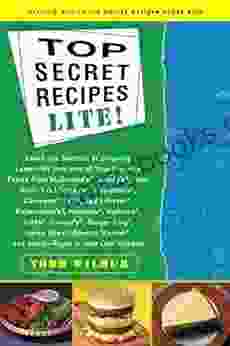
 Jerome PowellUnlock Culinary Secrets with Top Secret Recipes Lite: A Comprehensive Guide...
Jerome PowellUnlock Culinary Secrets with Top Secret Recipes Lite: A Comprehensive Guide...
 Forrest BlairThe Encyclopedia of Imaginary and Mythical Places: A Literary Odyssey into...
Forrest BlairThe Encyclopedia of Imaginary and Mythical Places: A Literary Odyssey into... Gilbert CoxFollow ·14.2k
Gilbert CoxFollow ·14.2k Willie BlairFollow ·3.4k
Willie BlairFollow ·3.4k Eddie BellFollow ·12.8k
Eddie BellFollow ·12.8k Simon MitchellFollow ·15.7k
Simon MitchellFollow ·15.7k Vernon BlairFollow ·5.8k
Vernon BlairFollow ·5.8k Ethan MitchellFollow ·8.2k
Ethan MitchellFollow ·8.2k Bill GrantFollow ·19.9k
Bill GrantFollow ·19.9k Calvin FisherFollow ·9.1k
Calvin FisherFollow ·9.1k

 Virginia Woolf
Virginia WoolfGetting High Fat Diet Easily Using Keto Fat Bomb Cookbook
Unveiling the Power of Fat...

 Milan Kundera
Milan KunderaAre You Cryin' Brian? Find the Inspiration and Humor in...
Life can be full of...

 Edmund Hayes
Edmund HayesUnlock Your Vitality: The 15-Day Natural Energy Boost...
Are You Ready to...
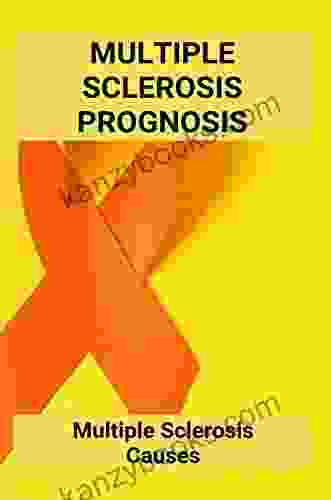
 Gavin Mitchell
Gavin MitchellMultiple Sclerosis Life Expectancy: Unveiling the Impact...
Multiple Sclerosis (MS) is a...

 Gabriel Garcia Marquez
Gabriel Garcia MarquezGet The Thighs That Can Crack Man Head Like Walnut
Are you tired of weak, flabby...
4.6 out of 5
| Language | : | English |
| File size | : | 4225 KB |
| Text-to-Speech | : | Enabled |
| Screen Reader | : | Supported |
| Enhanced typesetting | : | Enabled |
| Word Wise | : | Enabled |
| Print length | : | 308 pages |


